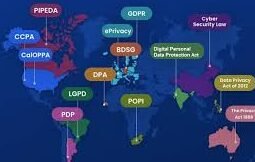As the digital age progresses, data privacy has become a paramount concern for individuals, businesses, and governments worldwide. The introduction of new data privacy laws is aimed at protecting personal information and ensuring that organizations handle data responsibly. Here are sixteen key points to help you understand the latest data privacy laws and their implications.
General Data Protection Regulation (GDPR)
The GDPR, implemented by the European Union in May 2018, is one of the most comprehensive data protection laws globally. It applies to any organization processing the personal data of EU residents, regardless of where the organization is based. Key provisions include strict consent requirements, data subject rights, and significant penalties for non-compliance.
California Consumer Privacy Act (CCPA)
The CCPA, effective from January 2020, grants California residents new rights concerning their personal information. It requires businesses to disclose data collection practices, allows consumers to opt-out of data sales, and mandates businesses to delete personal data upon request. The law also imposes penalties for violations, enhancing consumer privacy protections.
California Privacy Rights Act (CPRA)
The CPRA, which amends the CCPA and comes into full effect in 2023, introduces additional protections and establishes the California Privacy Protection Agency (CPPA). Key enhancements include stricter regulations on data sharing, expanded consumer rights, and increased penalties for breaches involving minors’ data.
Brazil’s General Data Protection Law (LGPD)
Brazil’s LGPD, effective since September 2020, is similar to the GDPR and applies to any entity processing personal data in Brazil. It emphasizes consent, transparency, and accountability, granting data subjects rights to access, correct, and delete their data. Non-compliance can result in substantial fines and sanctions.
Personal Data Protection Act (PDPA) in Singapore
Singapore’s PDPA, which came into force in 2014, regulates the collection, use, and disclosure of personal data. It requires organizations to obtain consent, provide access to data subjects, and implement security measures to protect personal data. Recent amendments include mandatory breach notifications and increased penalties for non-compliance.
India’s Personal Data Protection Bill (PDPB)
India’s PDPB, still in the legislative process, aims to provide a robust framework for data protection. It proposes strict regulations on data processing, including data localization requirements, data subject rights, and the establishment of a Data Protection Authority. The bill also emphasizes accountability and transparency in data handling practices.
Australia’s Privacy Act
Australia’s Privacy Act, originally enacted in 1988 and amended multiple times, governs the handling of personal information by federal agencies and private sector organizations. The act includes principles for fair information practices, data breach notification requirements, and significant penalties for non-compliance. Ongoing reforms aim to strengthen privacy protections further.
Japan’s Act on the Protection of Personal Information (APPI)
Japan’s APPI, amended in 2020, enhances privacy protections and aligns with international standards like the GDPR. It introduces stricter consent requirements, data breach notification obligations, and increased penalties for violations. The law also regulates cross-border data transfers to ensure adequate protection of personal information.
South Africa’s Protection of Personal Information Act (POPIA)
South Africa’s POPIA, effective from July 2021, establishes comprehensive data protection principles. It requires organizations to obtain consent, ensure data accuracy, and implement security measures. Data subjects have rights to access, correct, and delete their data. The Information Regulator oversees compliance and enforcement.
Canada’s Personal Information Protection and Electronic Documents Act (PIPEDA)
PIPEDA, in force since 2000 and amended over the years, governs how private sector organizations handle personal information in Canada. It mandates obtaining consent, limiting data collection, and ensuring data accuracy. Recent proposals aim to modernize PIPEDA, introducing stricter regulations and enhanced enforcement mechanisms.
China’s Personal Information Protection Law (PIPL)
China’s PIPL, effective from November 2021, is a comprehensive data protection law that imposes strict requirements on data processing. It emphasizes data subject rights, cross-border data transfer regulations, and significant penalties for non-compliance. The law aims to protect personal information and promote responsible data practices.
New Zealand’s Privacy Act
New Zealand’s Privacy Act, which came into effect in December 2020, modernizes the country’s data protection framework. It introduces mandatory breach notifications, new compliance obligations, and increased enforcement powers for the Privacy Commissioner. The act ensures robust protection of personal information and aligns with international standards.
European Data Protection Board (EDPB) Guidelines
The EDPB issues guidelines and recommendations to help organizations interpret and comply with the GDPR. These guidelines provide clarity on complex issues such as data transfers, consent, and data subject rights. Staying informed about EDPB guidelines is essential for organizations operating within the EU or handling EU residents’ data.
U.S. State-Level Privacy Laws
In addition to the CCPA and CPRA, several U.S. states have enacted or proposed their own data privacy laws. For example, Virginia’s Consumer Data Protection Act (CDPA) and Colorado’s Privacy Act (CPA) introduce comprehensive privacy protections, including data subject rights and regulatory enforcement. Organizations must navigate a complex landscape of state-level regulations.
International Data Transfer Regulations
Data transfer regulations impact how organizations move personal data across borders. The GDPR’s Standard Contractual Clauses (SCCs) and the Schrems II ruling, which invalidated the EU-U.S. Privacy Shield, highlight the complexity of international data transfers. Compliance with these regulations requires implementing appropriate safeguards to ensure data protection.
Emerging Trends and Future Developments
Data privacy laws continue to evolve in response to technological advancements and emerging threats. Key trends include increasing emphasis on data sovereignty, the rise of data protection authorities, and growing international cooperation on privacy enforcement. Staying ahead of these developments is crucial for organizations to maintain compliance and protect personal data.
Understanding and navigating the latest data privacy laws is essential for organizations that handle personal information. From the GDPR and CCPA to emerging regulations worldwide, these laws aim to protect individuals’ privacy rights and ensure responsible data practices. By staying informed about these laws and implementing robust data protection measures, organizations can build trust with their customers, avoid significant penalties, and stay ahead in an increasingly privacy-conscious world.







